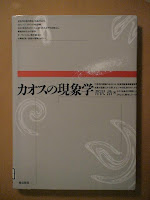
Unbroken Arrow
Chohei KambayashiISBN 978-4152090515
This is the third book of
Yukikaze series.
Kambayashi is one of the most
discriminating Sci-
Fi authors in Japan.
For years,
Kambayashi has been seeking for a bit philosophical things.
"What is reality?" for example.
Yukikaze series is a story about a battle between human beings and aliens called Jam which look like machinery life form, especially forms of combat airplanes.
In the first book of
Yukikaze series,
Kambayashi wrote mainly on relationship between human beings and machines.
In the second book, he tried to describe differences between human beings and Jam, but still the main focus was on the earth side. Actually, the relationship between human beings and
Yukikaze, the most cutting edge artificial intelligence optimized for battle.
Here, the point is, the alien, Jam, was described as completely 'alien' throughout the two books. Anyway, too different to understand each other.
Here in the third book,
Kambayashi steps into a new stage.
The story begins when a journalist received a mail from the planet Fairy, the battle field, connected by subspace corridor in the Antarctica. The sender is a human, a renegade commander of the earth side force in the planet, and his message was a proclamation of war on behalf of Jam...
Thus, there are not so many dog fight scenes of airplanes like the previous two books, but it's full of dizzy but meaning a great deal scenes which
Kambayashi is good at.
I assure you that the book is worth reading. :)



















